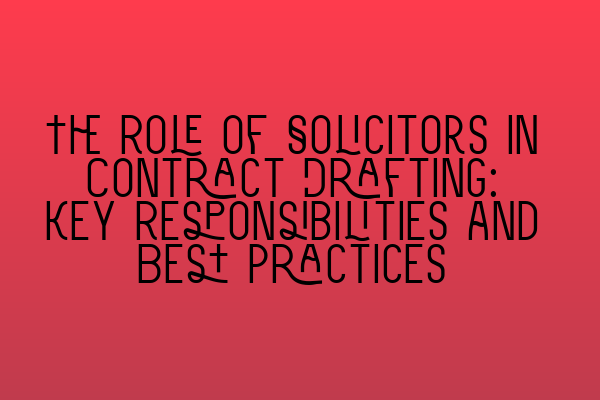The Role of Solicitors in Contract Drafting: Key Responsibilities and Best Practices
In the world of business, contracts are the cornerstones of legal agreements. They establish the rights and obligations of parties involved, provide clarity in business relationships, and protect the interests of individuals and organizations. As a solicitor, your role in contract drafting is pivotal, ensuring that contracts are legally sound, enforceable, and meet the specific needs of your clients. In this article, we will explore the key responsibilities and best practices that solicitors should adhere to in contract drafting.
The Importance of Contract Drafting
Before delving into the role of solicitors in contract drafting, let’s first acknowledge the significance of well-drafted contracts. Contracts serve as the foundation of any business transaction or relationship, and a poorly drafted contract can lead to costly disputes, legal complications, and damaged relationships. By focusing on meticulous contract drafting, solicitors play a vital role in mitigating risks and setting the stage for successful agreements.
Key Responsibilities of Solicitors in Contract Drafting
1. Understanding Client Objectives: As a solicitor, your first responsibility in contract drafting is to gain a comprehensive understanding of your client’s objectives and requirements. This involves conducting thorough interviews, reviewing relevant documents, and engaging in open communication to identify your client’s priorities and goals.
2. Identifying Legal Issues and Risks: Once you have a clear understanding of your client’s objectives, your role is to identify any legal issues or potential risks associated with the contract. This requires a comprehensive understanding of contract law and keeping up-to-date with the latest legal developments.
3. Customizing Contract Terms: One of the primary responsibilities of a solicitor in contract drafting is tailoring contract terms to meet the specific needs of your client. This includes drafting clauses and provisions that address your client’s objectives while considering legal requirements, industry standards, and best practices.
4. Negotiating with Counterparties: Solicitors often play an essential role in contract negotiations, ensuring that their client’s interests are protected and that the final contract represents a fair and balanced agreement. Effective negotiation skills, coupled with a deep understanding of contract terms, can help solicitors reach favorable outcomes for their clients.
5. Reviewing and Analyzing Existing Contracts: In addition to drafting contracts from scratch, solicitors are often involved in reviewing and analyzing existing contracts. This includes identifying potential legal issues, outdated provisions, and ensuring compliance with relevant laws and regulations.
6. Advising on Legal Considerations: Solicitors serve as trusted advisors to their clients, providing expert guidance on legal considerations related to the contract. This may involve explaining the implications of certain clauses, highlighting potential risks, and suggesting alternative approaches to mitigate legal issues.
7. Continuous Professional Development: To fulfill their responsibilities effectively, solicitors must stay up to date with the latest legal developments, industry trends, and best practices in contract drafting. Continuous professional development through attending relevant seminars, workshops, and conferences is crucial to ensure that solicitors maintain their expertise and provide the highest quality of service to their clients.
Best Practices in Contract Drafting
1. Clear and Concise Language: Use plain and understandable language in contract drafting to minimize ambiguity and reduce the risk of misinterpretation. Avoid excessive legal jargon that may confuse parties involved.
2. Thorough Due Diligence: Conduct comprehensive due diligence in the contract drafting process to ensure that all relevant information is considered, potential risks are identified, and legal compliance is addressed.
3. Consideration of Jurisdiction and Applicable Laws: Take into account the jurisdiction and applicable laws that govern the contract. This includes considering international laws if the contract involves cross-border transactions.
4. Meticulous Clause Structure: Organize the contract into clearly defined sections and paragraphs, ensuring that each clause is logical, coherent, and properly referenced for ease of understanding and quick reference.
5. Properly Defined Rights and Obligations: Clearly define the rights and obligations of each party involved to avoid any confusion or disputes in the future. Ensure that the responsibilities of the parties are balanced and fair.
6. Inclusion of Dispute Resolution Mechanisms: Incorporate dispute resolution mechanisms, such as arbitration or mediation clauses, to provide a framework for resolving conflicts in a cost-effective and efficient manner.
7. Regular Communication with Clients: Maintain open and regular communication with clients throughout the contract drafting process. Seek their input, keep them informed of progress, and address any concerns or questions they may have.
Conclusion
As a solicitor, your role in contract drafting is crucial in ensuring that your clients’ legal agreements are sound, enforceable, and aligned with their objectives. By understanding your clients’ goals, identifying legal issues and risks, and customizing contract terms, you can play a pivotal role in safeguarding your clients’ interests and establishing successful business relationships. By adhering to best practices, continuously improving your skills, and staying up to date with legal developments, you can elevate your contract drafting skills and deliver value to your clients.
Would you like to know more about related topics? Check out these articles:
– Navigating Legal Challenges and Pitfalls in Your Practice
– Ethical Responsibilities of Solicitors: Upholding Professionalism
– Barrister vs. Solicitor: A Comprehensive Comparison
– Understanding the SRA Competence Statement: A Guide for Solicitors
– Networking for Solicitors: Strategies for Building a Strong Network
